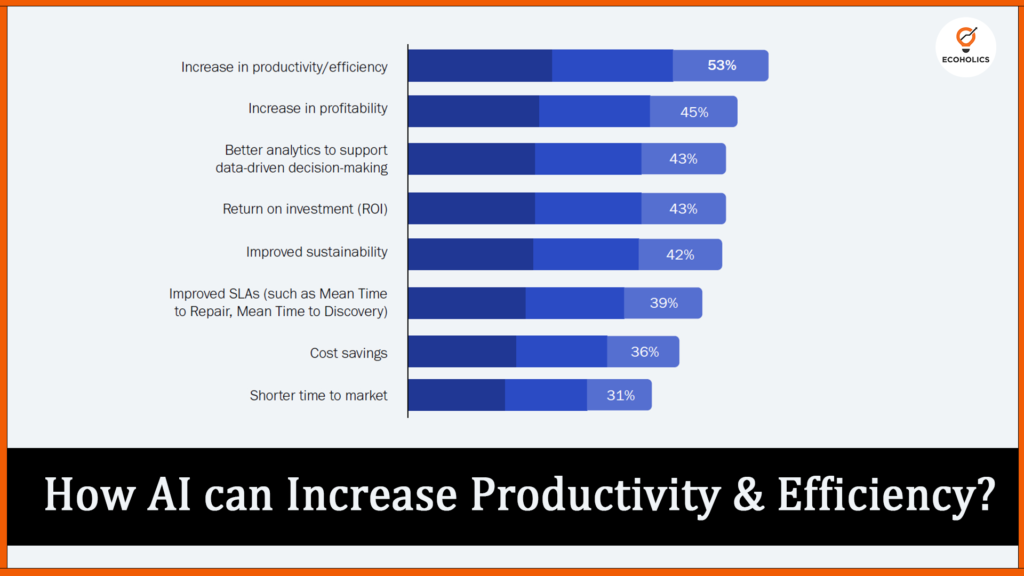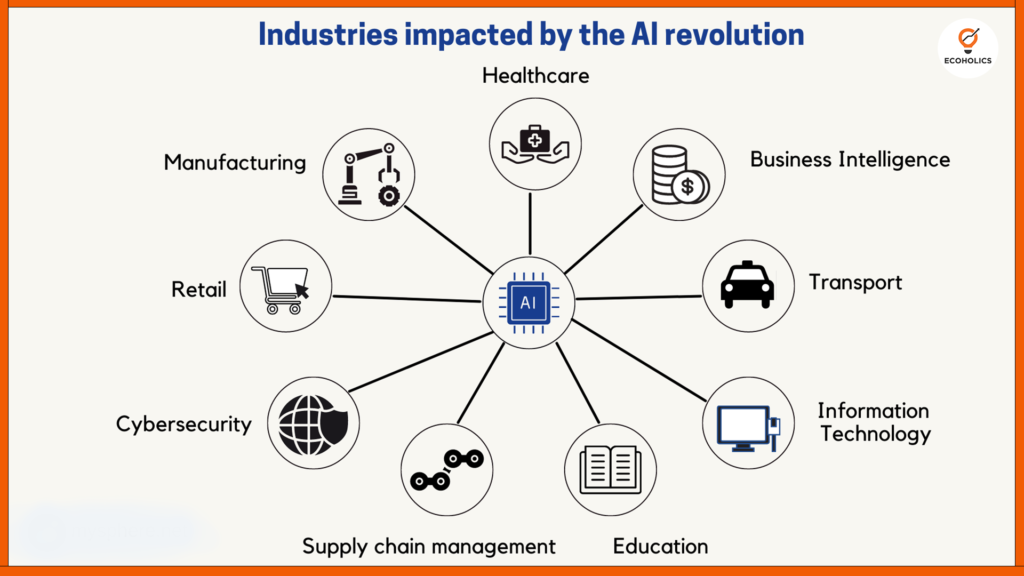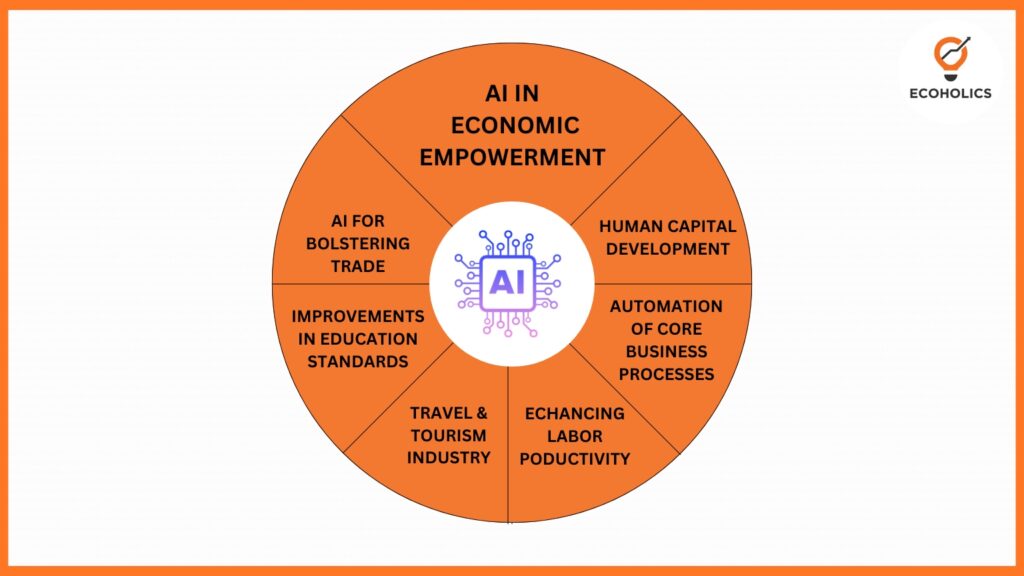
Impact of Using Artificial Intelligence on the Global Economy
- Experts are actively exploring the possibilities of using AI in the global economy.
- Incorporating AI has the potential to boost global economic growth significantly.
Advancements in artificial intelligence technology are heavily influencing nearly every sector, including the global economy, in both ways. AI can increase productivity and efficiency, creating new industries and providing multiple jobs. It can significantly boost the global economy in more than one way. But specific challenges must be considered so this friend does not become a foe.
According to a study published by the European Parliament regarding the Economic impacts of artificial intelligence, the boom in computing power and connectivity has made it possible to compile and share large amounts of data. Interestingly, the AI patents between 2010 and 2015 increased at a rate of 6%, way higher than any other patent sector. Indicating the popularity and possibilities of artificial intelligence technology.
Interestingly, countries like Japan, South Korea and the United States have been forerunners in AI patents, accounting for nearly two-thirds of all AI-related patent applications. A recently conducted research by the International Monetary Fund ( IMF ) in 12 countries contributing over 0.5% of the world’s economic output suggests that 2035 AI could double the annual economic growth rates. This further indicates that AI has a strong potential to influence the global economy.
How AI can Increase Productivity & Efficiency? Artificial Intelligence
Artificial intelligence can be a game changer when it comes to increasing the productivity and efficiency of the global economy. Interestingly, the impacts can already be seen across various sectors. Strategic usage of artificial intelligence leads to the automation of repetitive tasks, enhances decision-making, provides personalised experiences, facilitates innovation and further optimises the global value chain.

Artificial intelligence is an expert in tackling repetitive tasks that could be time-consuming and mundane for humans. For instance, data entry, proper scheduling of administrative processes, and quality control in manufacturing. This automation can free up the human workforce to focus on more strategic and creative endeavours, increasing the output.
AI algorithms have the potential to analyse vast amounts of data to identify patterns and trends that humans might miss. This directly influences decisions and improves resource allocation, logistic optimisation, and risk management. For instance, AI can help in demand forecasting in retail, risk assessment in finance, etc.
The technology also facilitates personalised experience through products, services and marketing campaigns to individual customers. Its impact can be seen in online shopping and adaptive learning platform product recommendations. AI can also be used to develop new products and services, including drug discovery, materials science, renewable energy, etc. Developments in these sectors can influence the global economy.
Incorporating AI can also optimise the global value chains by increasing the efficiency of logistics and supply chains. It can also predict demand fluctuations and effective resource management. All these can lead to reduced costs, faster delivery times, and improved resource utilisation across borders. Artificial intelligence can increase the productivity and efficiency of the global economy.
Creation of New Industries & Jobs through AI Artificial Intelligence
Experts assert that the impact of advancements in artificial intelligence technology goes beyond just increasing productivity within existing industries. It also has the potential for creating entirely new industries and jobs benefiting the global economy. Many new avenues are opening up, leveraging AI advancements.

Personalised healthcare, comprehensive diagnostics, autonomous vehicle technology, and robotics are just a few industries becoming a reality due to artificial technology. These new industries focus on data collection, analysis and interpretation using artificial intelligence for multiple processes. These include market research, risk assessment, fraud detection, etc.
The Internet of Things (IoT) is gaining popularity, and people are actively using these products worldwide. Integrating AI with the Internet of Things brings AIoT an intelligent infrastructure that enables the proper functioning of smart cities and connected homes and creates new opportunities for development and jobs.
Multiple AI-powered design tools like generative AI, music composition platforms, content creation software, etc., have been developed to foster entirely new avenues for creative expression. Businesses, entrepreneurs, banks, financial institutes & governments are actively using AI, which is heavily influencing the global economy.
AI’s Job Creation Scenario
Proper incorporation of artificial intelligence is believed to create new jobs. AI specialists, including AI developers, trainers, ethics and data scientists, and cybersecurity experts, would have decent job opportunities. The human-AI collaboration would facilitate opportunities for humans to work alongside AI systems, for instance, AI-assisted lawyers, doctors, teachers, etc.
The widespread adoption of artificial intelligence technology would create multiple job possibilities. The new roles would be installing, maintaining and troubleshooting these complex systems. However, this adoption would require immense reskilling and upskilling of the existing workforce.
Artificial intelligence adoption would empower developing economies by bridging the gap in skilled and unskilled workforce. Also, adopting artificial intelligence in the global economy would require international cooperation. This is crucial because it can ensure the possibility of responsible development and equitable access to the benefits of technology.
Artificial Intelligence & Economic Boost
The widespread adoption of artificial intelligence is believed to boost the global economy, mainly because of the technology’s immense potential to unlock significant economic gains worldwide. AI adoption can also increase GDP, enhance competitiveness, and improve resource management.

Increased GDP
AI’s automation capability of repetitive tasks can free up human labour for higher-value activities. It can optimise processes that lead to significant productivity across various sectors. AI can fuel innovation by creating new products and services like personalised medicine, renewable energy, and intelligent infrastructure.
Artificial intelligence can analyse vast amounts of data and help identify patterns invisible to the human eye. This allows businesses to make informed decisions, better resource allocation, optimise marketing campaigns and reduce risks. Furthermore, optimisation of the global value chain could improve logistics, predict demand fluctuations and effectively manage inventory.
Enhanced Competitiveness
AI adoption provides a competitive advantage for businesses in the global marketplace, as it offers personalised products and services and market campaigns to individual customers. By leveraging the data analysis capability of AI, businesses can now have more profound insights into market trends, customer preferences, and competitor insights.
This data allows businesses to make informed decisions and adapt quickly to the changing marketplace. With automation capabilities, companies can reduce labour costs and operational expenses, making them more competitive in pricing and enabling them to reinvest resources into innovation and other growth areas.
Improved Resource Management
Multiple AI-powered solutions in agriculture could optimise water usage, fertiliser application, and pest control, leading to increased crop yields and reduced resource wastage. AI can also forecast energy demand, optimise energy distribution, and strategically integrate renewable energy sources more efficiently into the grid.
Artificial intelligence is believed to be a master in data analysis, using this power businesses can now properly analyse product life cycles, optimise recycling processes, etc., and facilitate a circular economy where resources are reused and repurposed effectively. Banks and governments can significantly improve resource management by properly incorporating artificial intelligence businesses.
Challenges & Consideration of AI in the Global Economy
Incorporation of artificial intelligence could have multiple benefits for the global economy, but it comes with its own set of limitations and challenges that need to be considered. It ranges from ethical concerns to economic and social issues, governance, and regulations.
AI algorithms are believed to inherit and amplify existing biases in the data used to train them, which can lead to discriminatory outcomes. Biases like loan approval, facial recognition and hiring could have severe consequences. Some AI systems operate as black boxes, making understanding decision-making processes and identifying potential biases challenging.
Automation fueled by AI might lead to job losses in specific industries. It requires proactive policies for reskilling and upskilling workers to avoid mass unemployment. Unequal access to AI technology and its benefits could increase economic and social inequalities.
Currently, there are only a few regulations surrounding AI development and use. This creates uncertainty and opens up possibilities of potential misuse. Determining who is responsible for AI decisions and potential harms remains a considerable challenge.
Nonetheless, incorporating artificial intelligence can have multiple benefits for the global economy. It can increase productivity and efficiency, create new industries and jobs, boost economies, etc. But there are still a lot of challenges that need to be addressed. However, the future possibilities seem endless.



